General
Mak Mourns Prof. Banadda, Unveils Plans for ICU & Oxygen Plant
Published
5 years agoon
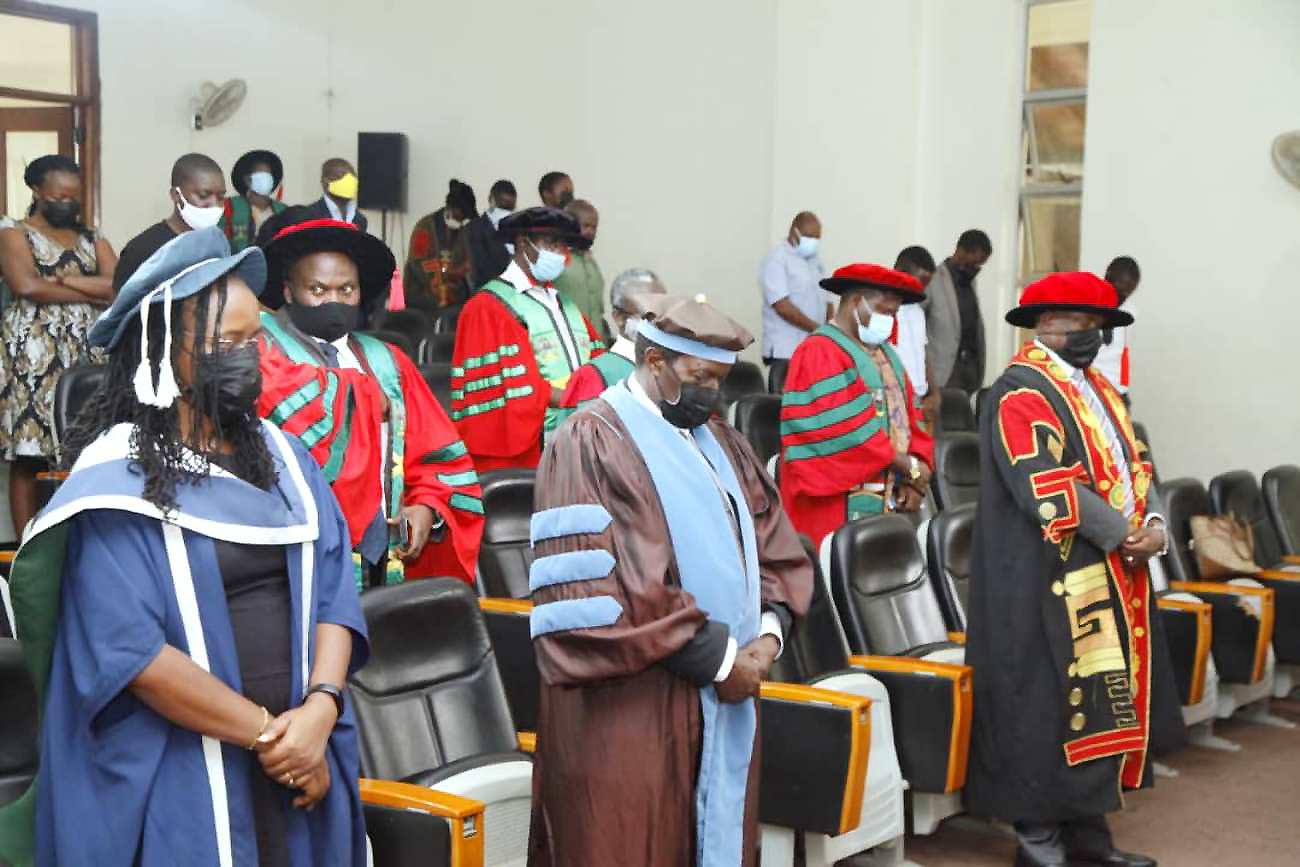
By Jane Anyango
Hundreds of mourners on Friday 2nd July, 2021 flocked social media platforms to pay their last respects to the Makerere University don and iconic Professor, the Late Noble Ephraim Banadda, who succumbed to COVID-19 on 1st July 2021 at CASE Hospital in Kampala after battling for his life for about one month.
The church service conducted physically and online at Makerere University’s School of Food Technology, Nutrition and Bioengineering Conference Hall attracted 500 participants on zoom, 78 on Facebook, 80 on YouTube, 40 on Instagram and 100 on twitter.
The function was graced by Makerere University leadership including the Chancellor Prof. Ezra Suruma, Council Chairperson Mrs. Lorna Magara, the Vice Chancellor Prof. Barnabas Nawangwe, Deputy Vice Chancellor (Academic Affairs) Dr. Umar Kakumba, Ag. Deputy Vice Chancellor (Finance and Administration) Dr. Josephine Nabukenya, Director Gender Mainstreaming Dr. Euzobia Mugisha Baine as well as Dean School of Women and Gender Studies Dr. Sarah Ssali and Chairperson Makerere University Research and Innovations Fund (Mak-RIF) Grants Management Committee (GMC) Prof. William Bazeyo.
The service was also attended by the Principal College of Agricultural and Environmental Sciences (CAES) Prof. Bernard Bashaasha, Principal College of Engineering, Design, Art and Technology (CEDAT) Prof. Henry Alinaitwe, the Dean School of Food Technology, Nutrition and Bioengineering Dr. Abel Atukwase and Makerere University Academic Staff Associaiton (MUASA) Vice Chairperson, Prof. Edward Mwavu. Others were staff, students, friends and family members and relatives to the deceased and members from the diaspora.
The Church service
The service was led by the Executive Secretary of the Seventh Day Adventist Church of Uganda (SDA) Pastor Dr. Maka Moses accompanied by the Chair Makerere University SDA Students Association Dr. Milka.
In his summon, Pastor Maka told the congregation that as they mourn the departed pillar of Makerere University, they should remember that his is over and it is now about them.
In his key message, Pastor Maka told mourners that as they do research, go about their business and make investments, they should know that death can strike any time imploring them to do the best for every day they live and also build their spiritual capital as well.
“Psalms 90:12 teaches us to number and remember our days that we may gain the hearts of wisdom. The French philosopher Jack said, we are born crying, we go through life complaining and die unsatisfied”, the Pastor said.
Pastor Maka said the greatest fear for humans is death because no one will ever get used to it nor get experience in it.
Speech by Chancellor
The Chancellor Prof. Ezra Suruma described the death of Prof. Banadda as an indelible loss to the family and a huge loss to the country.
“Banadda was just born in 1975 when I had been a lecturer for 18 months and enrolled for my PhD. It is hard to accept that, that young man, has gone from us.
He stood out, invited me to officiate at a number of events and when he got the Vatican Award, he informed me.
He was on the special subcommittee of the economy on agro processing and the speed at which he responded to work assignments was remarkable. This loss to Uganda is unbearable but we have no choice, we have to submit to Gods will.
His life was gentle and elements well mixed, nurtured all over Uganda, a special man who touched, helped and worked for his family and country. Now he is gone, we pray that we shall be in heaven with him and will live with him in eternity”. Prof. Suruma remarked.
Speech by Chairperson Council
Mrs. Lorna Magara said it was a very difficult afternoon from the previous day when Makerere was filled with heavy hearts at the loss of Prof. Banadda that has left many speechless and depressed. On behalf of Council, Mrs. Magara conveyed condolence to the bereaved family and University fraternity.
“Prof. Banadda was one of those members that warmly welcomed me to council and pledged support. He was one council member that was assuring and very supportive. We became friends and even when he left council, he would send video clips and never failed to send a joke or two.
The loss of Banadda has been one of the most painful and difficult one I have ever faced. Noble has been a prolific academic in University policy space.
Banadda never shied away from responsibility. The somber mood that has swallowed the University demonstrates how he touched the lives of many people.
As we mourn, let us remember to celebrate his incredible achievements in 46 years. Let us celebrate a father, colleague, and countryman. Council commits him in the arms of the Lord. He will be dearly missed by all,” said Mrs. Magara.
Speech by Vice Chancellor
The Vice Chancellor Prof. Barnabas Nawangwe said this was the time to celebrate a short, but great life urging the congregation to thank God for a life well lived.
He said at the time of Prof. Banadda’s death, the medical bills stood at 110 million shillings. Of these 34 million had been cleared by the Petroleum Authority while 50 million had been raised by staff.
Prof. Nawangwe on behalf of the university delivered a two paged message of condolence detailing the early life of the Late professor, his career growth and contributions Banadda made to the university, the country and the world and the distinct persona of Banadda the late that left many in somber mood.
Prof. Nawangwe conveyed a message of condolence to the bereaved family, friends, relatives and university community verbatim below:
“It is with the deepest regret and heavy hearts that Makerere University Management, staff and students extend this message of condolence on the shocking and sudden death of Professor Noble Banadda, I extend my deepest sympathies to his loved ones, for the loss of such a brilliant Ugandan bio systems engineer, researcher and academician. We mourn a dedicated member of the academic community who has been taken from us so unexpectedly.
Banadda was born in Kampala, Uganda’s capital city on May 14, 1975. After attending local primary and secondary schools, he was admitted to Sokoine University of Agriculture, in Morogoro, Tanzania, graduating with a Bachelor of Science in Food Science and Technology.
His Master of Science degree in Process Engineering, together with his Doctor of Philosophy degree in Chemical Engineering, were both obtained from Katholieke Universiteit Leuven, in Leuven, Belgium. Later he studied in a post-doctoral fellowship at the Massachusetts Institute of Technology, in the United States.
Speech by Principal CAES
The Principal CAES Prof. Bernard Bashaasha described the day as a sad moment meant to condole with the bereaved family saying, they had all lost a life and love of a father, parent, friend and a good man.
“We have lost a good man, a true definition of our academic of the time. Looking at his research, academic, awards, I was touched. His teaching, internationalization and administrative foot print speak volumes for his achievements.
He joined university in January 2006 and quickly ran through the ranks to full professor. He has left a huge legacy with research, innovations on ground.
He built from scratch the Department of Agricultural and Bio systems engineering and led it to greater heights.
He was a friendly person, frank and down to earth in character and never hesitated nor shied away to take on responsibility.
He related with me as a friend not like his boss, worked hard to build his students and the university. Makerere has lost a pillar heading AICAD regional body, not only CAES and Makerere but also a loss to the global citizens.
He had many ambitions as a young man. We pray that God gives solace to the family to cope. We have many questions unanswered. May God provide the answers.” Prof. Bashaasha submitted.
Speech Chairperson Mak-RIF GMC
Prof. William Bazeyo said, it was a very sad moment for him to speak about Prof. Banadda who had been a very close friend. He sai,d the passing on of Prof. Banadda raises questions as to whether the country was losing the battle against COVID-19 or something else was happening.
Prof. Bazeyo implored the university to cherish what the fallen colleague Banadda had left behind.
“Banadda was a young man and has been staff for ten years but his impact on the university is more than many professors that have been here for over 30 years. The greatest loss is on Makerere University. We have lost many people but this time, we have lost one who would build the University when we are not here.
He had many friends in Makerere and outside, the ones that he has walked with every day and he would sit with them at Piato restaurant just to talk about work”, Prof. Bazeyo said.
On plans to establish a University ICU and oxygen plant
Prof Bazeyo said the demise of Banadda had left a big hole in the CAES. He however noted that the late professor was not selfish and shared his works and therefore should find means of filling this gap.
He said, the Vice Chancellor was doing all it takes to establish an ICU at Makerere University Hospital and also build an oxygen plant.
“For three months, we are going to make sure that we have an alternative place for Ugandans to access medical services” He said.
The recording of Live proceedings from the Service to Celebrate the Life of Prof. Noble Ephraim Banadda may be accessed by clicking the embedded video below.
You may like
-
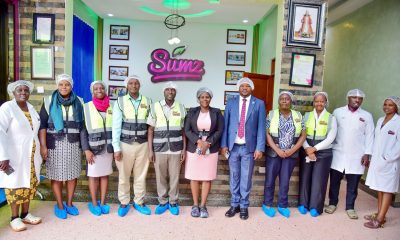

Makerere Explores Strategic Industry Partnership with Psalms Food Industries to Strengthen Manufacturing Innovation
-


Makerere Graduation Underscores Investment in Africa’s Public Health Capacity
-


Mak News Magazine: February 2026
-
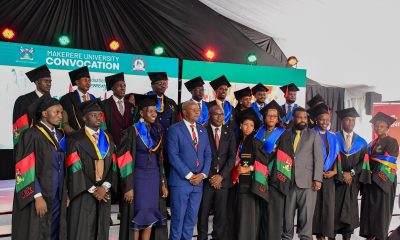

76th Graduation Ceremony: CoBAMS Staff and Graduates Win Excellence Awards
-


Makerere’s 76th Graduation Ceremony: CHS showcases research strength with 26 PhD Graduates
-


Mak 76th Graduation Ceremony: CoNAS Presents 16 PhDs & Best Performing Male Student in the Sciences
General
Makerere Explores Strategic Industry Partnership with Psalms Food Industries to Strengthen Manufacturing Innovation
Published
11 hours agoon
March 4, 2026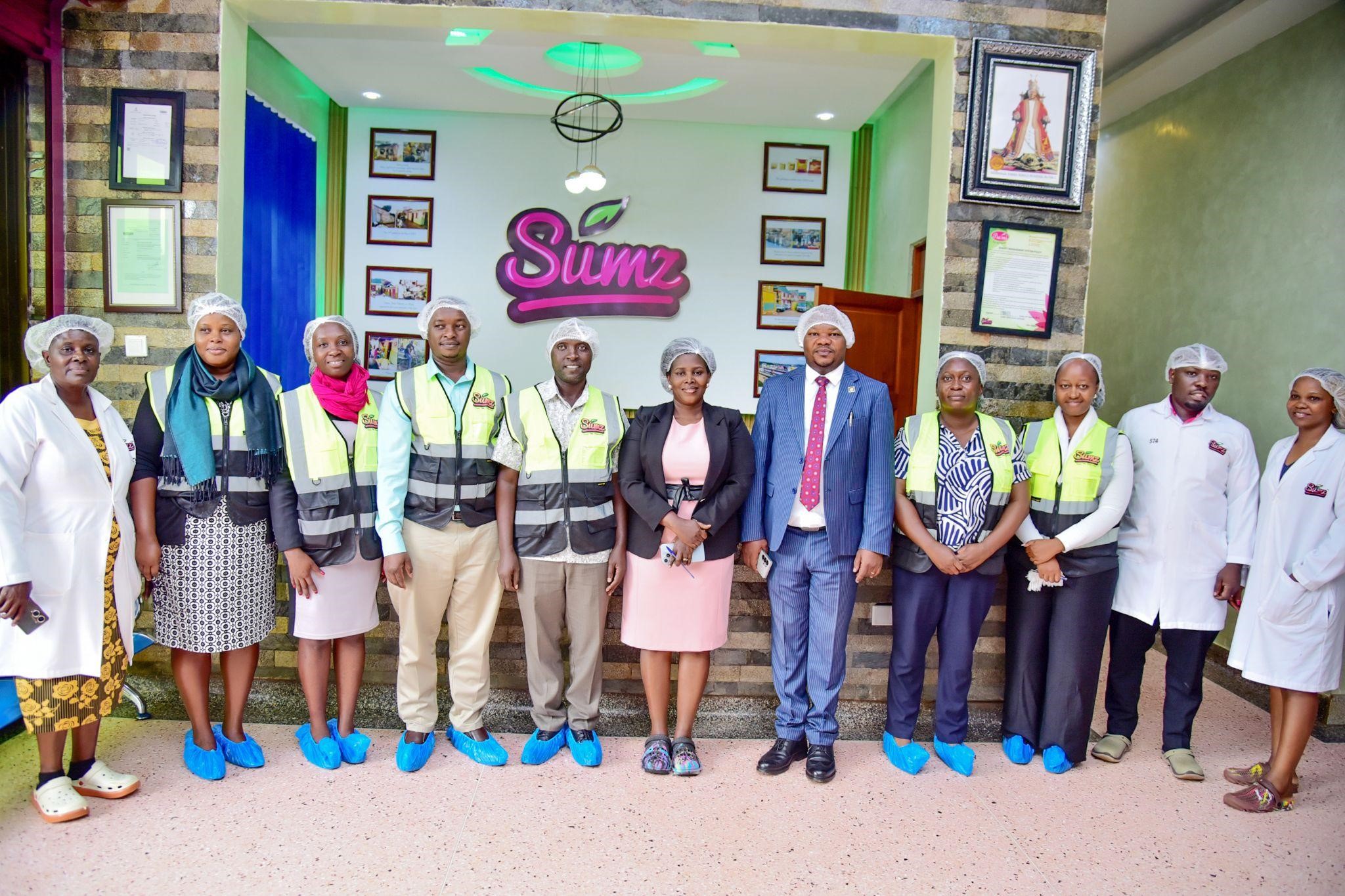
On 2nd March, 2026, representatives from the Advancement Office, the College of Business and Management Sciences and the University Innovation Pod visited Psalms Food Industries to discuss a prospective partnership aimed at strengthening university–industry collaboration in manufacturing, research, innovation, and skills development.
Psalms Food Industries, a homegrown snacks innovation and manufacturing company, operates three major brands, namely, Sumz, Afrikan Harvest and Krunchables, which have grown to a range of 37 products and target the introduction of five new products annually. The company distributes products across Kenya, Rwanda, the Democratic Republic of Congo, South Sudan, and, recently, Tanzania. As a labour of love, the idea of producing snacks was born during the honeymoon of Mr and Mrs Ngabirano, who now run Psalms Food Industries side by side.
Dr. Denis Ngabirano, CEO and Co-Founder of Psalms Food Industries, during the meeting, described the company as “a snacks innovation house, with all our products developed in-house.” He noted.
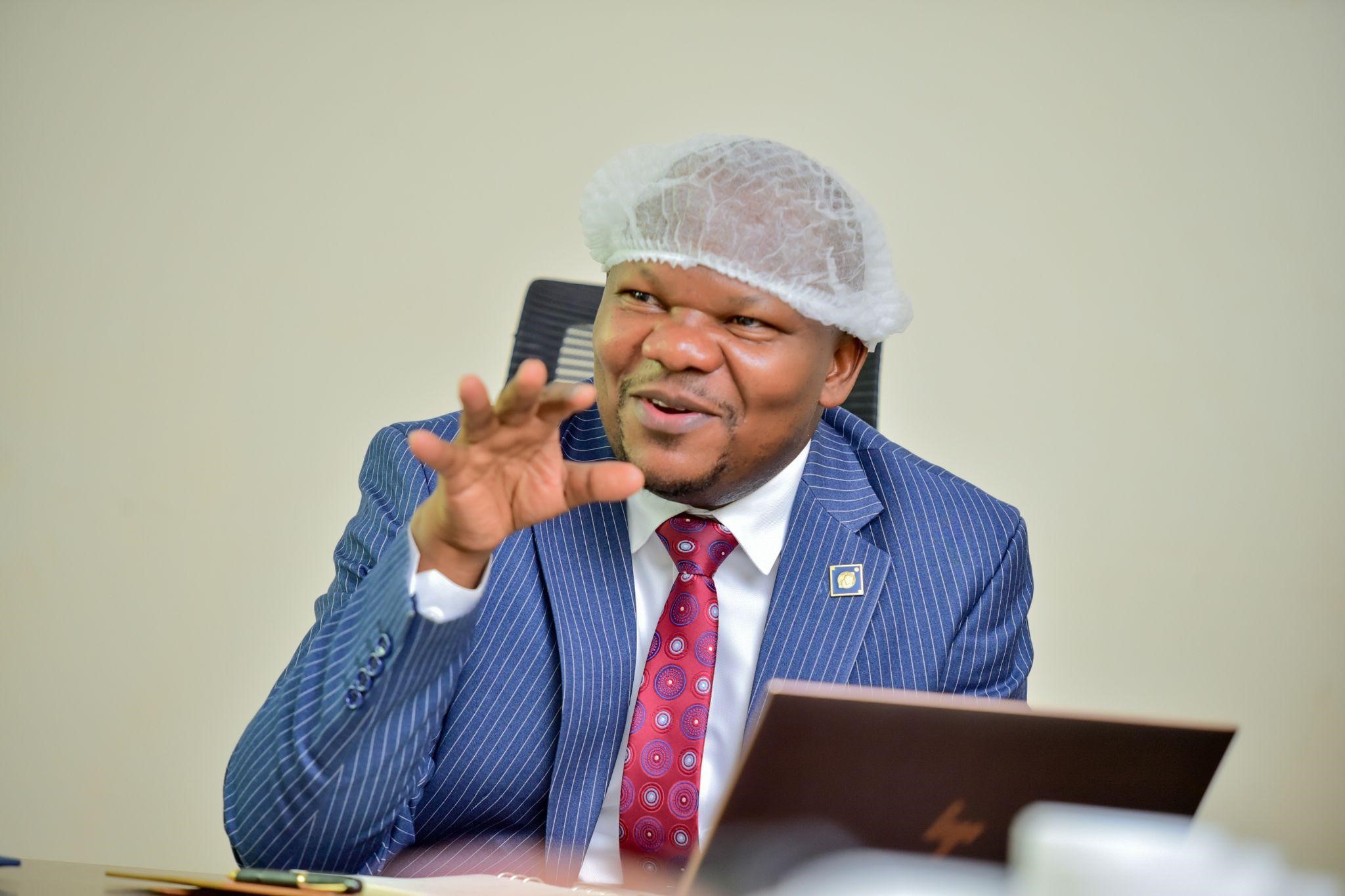
He emphasised the company’s commitment to quality assurance and consumer-centred research, noting that Psalms conducts surveys and gathers customer feedback to inform product development, supported by an internal microbiology and chemistry laboratory.
Dr. Denis Ngabirano noted that the company had only recently introduced two brands, “Afrikan Harvest for it’s health conscious clientele and Kruchables for it’s volume centric clientele.
“Afrikan Harvest has no additives, it is a brand for health-focused consumers,” he explained, while highlighting the differentiated positioning of their product lines. “Sumz is our premium brand, and Krunchables focuses on volume.”
Student-Centered Experiential Learning
A key focus of the meeting was structured experiential learning for students across disciplines. Potential areas of collaboration include internships, graduate trainee pathways, and hands-on exposure within Psalms’ incubation and production facilities.
The proposed engagement spans multiple fields, including environmental sciences, engineering, procurement and logistics, finance and accounting, quality control, production and manufacturing, human resource management, marketing, and international business.
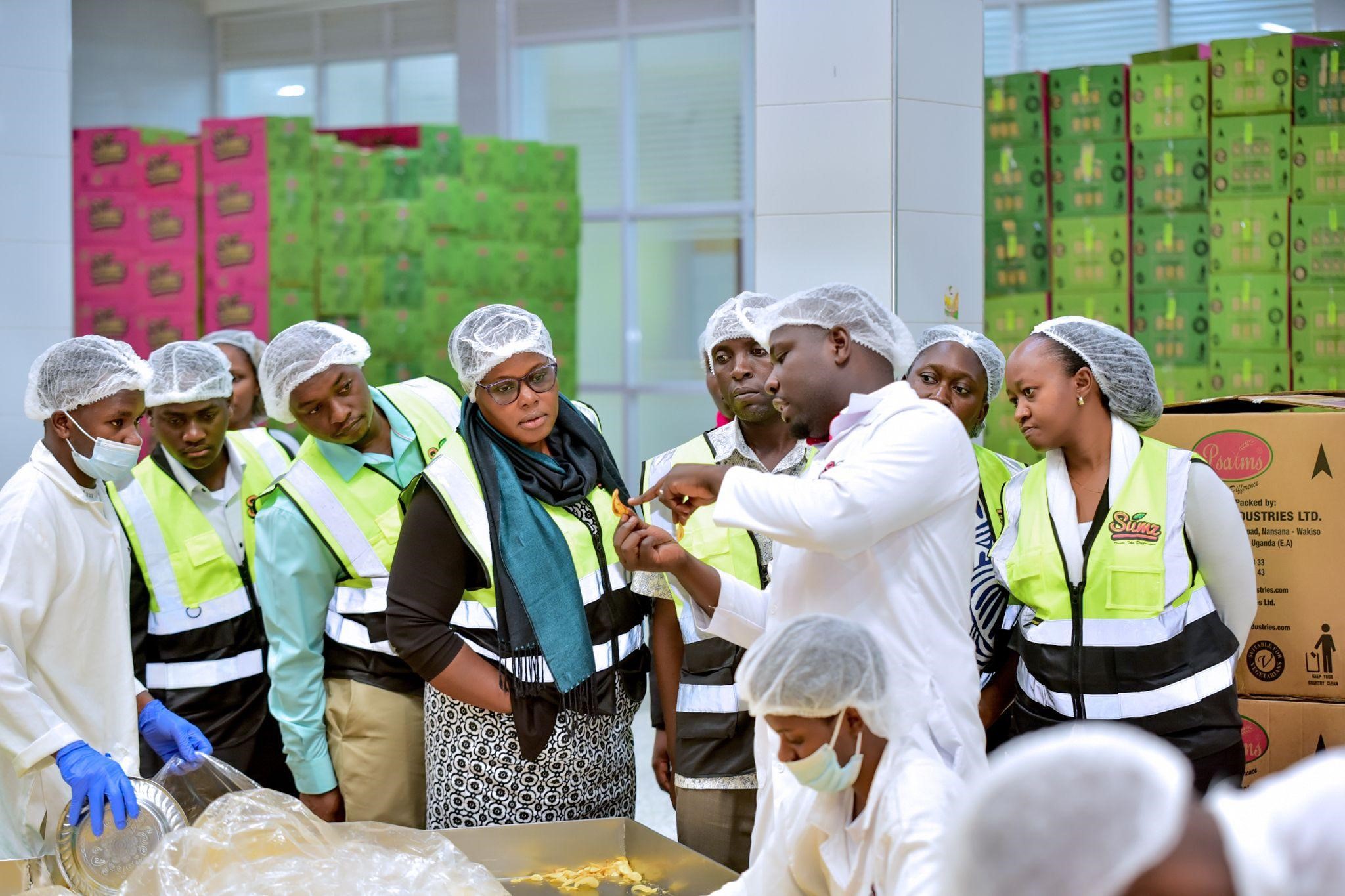
The partnership could provide students with direct exposure to real-time production systems, standard operating procedures (SOPs), and quality assurance frameworks, strengthening the practical relevance of their academic training.
Among the innovative ideas discussed was a potential competition involving students from the Fine Art and Industrial Design disciplines to redesign packaging for selected Sumz products. The proposal would allow top designs to be commercially adopted, creating a direct bridge between creativity, intellectual property development, and industrial application.
Research, Innovation and Commercialisation
Both institutions expressed interest in joint applied research initiatives, particularly in process optimisation, data analytics for manufacturing efficiency, product improvement, and sustainable production systems.
Opportunities were also discussed around collaborative research in machine design, crop development for snack processing, and factory energy solutions, areas that not only benefit Psalms but have broader implications for Uganda’s manufacturing sector.
The engagement further highlighted potential linkages with the University’s innovation and commercialisation structures, including the University Innovation Pod (UNIPOD), to support co-creation and scaling of student-led innovations.
Mr Awel Uwihanganye, Chief Advancement Officer at Makerere University, proposed strengthening the engagement through structured programming, including a planned collaboration between the University’s innovation Hub and the upcoming incubation Hub at Psalms Food Industries, particularly to support the commercialisation of research outcomes for both students and staff.
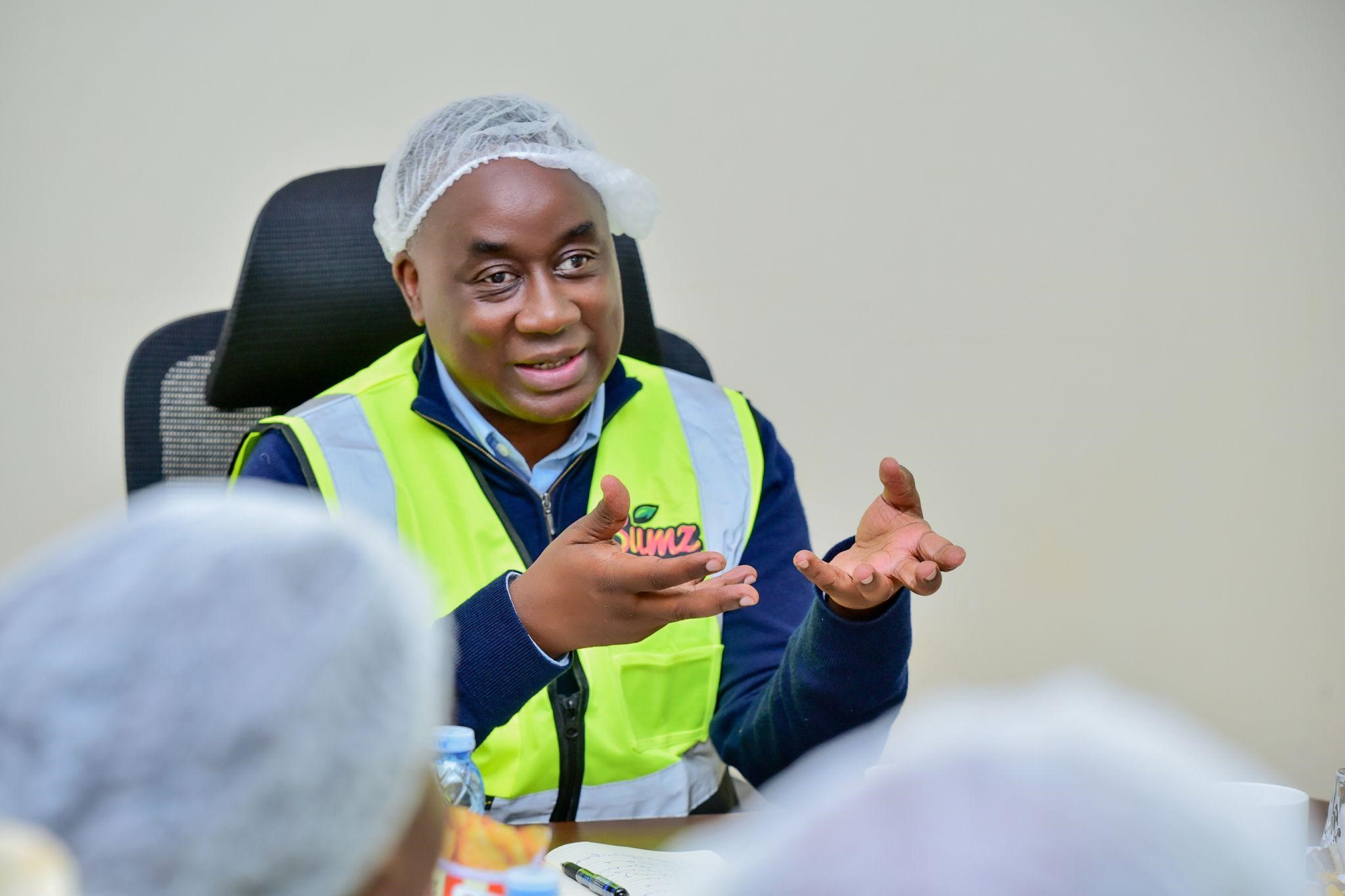
Curriculum Co-Creation and Staff Exchange
Beyond student placements, discussions also focused on co-developing academic content that responds more directly to industry needs, particularly within the manufacturing value chain.
Proposals included guest lectures by industry practitioners, staff exchange programmes to expose academic staff to factory operations, and tailored short courses for Psalms staff based on identified skills gaps.
Dr. Jude Mugarura, Head of the Department of Marketing and Management at COBAMS, emphasised the importance of embedding the partnership within academic programming. He proposed “internships for students in HR, marketing, international business, accounting and finance,” as well as staff exchanges to give University staff hands-on exposure to manufacturing operations.
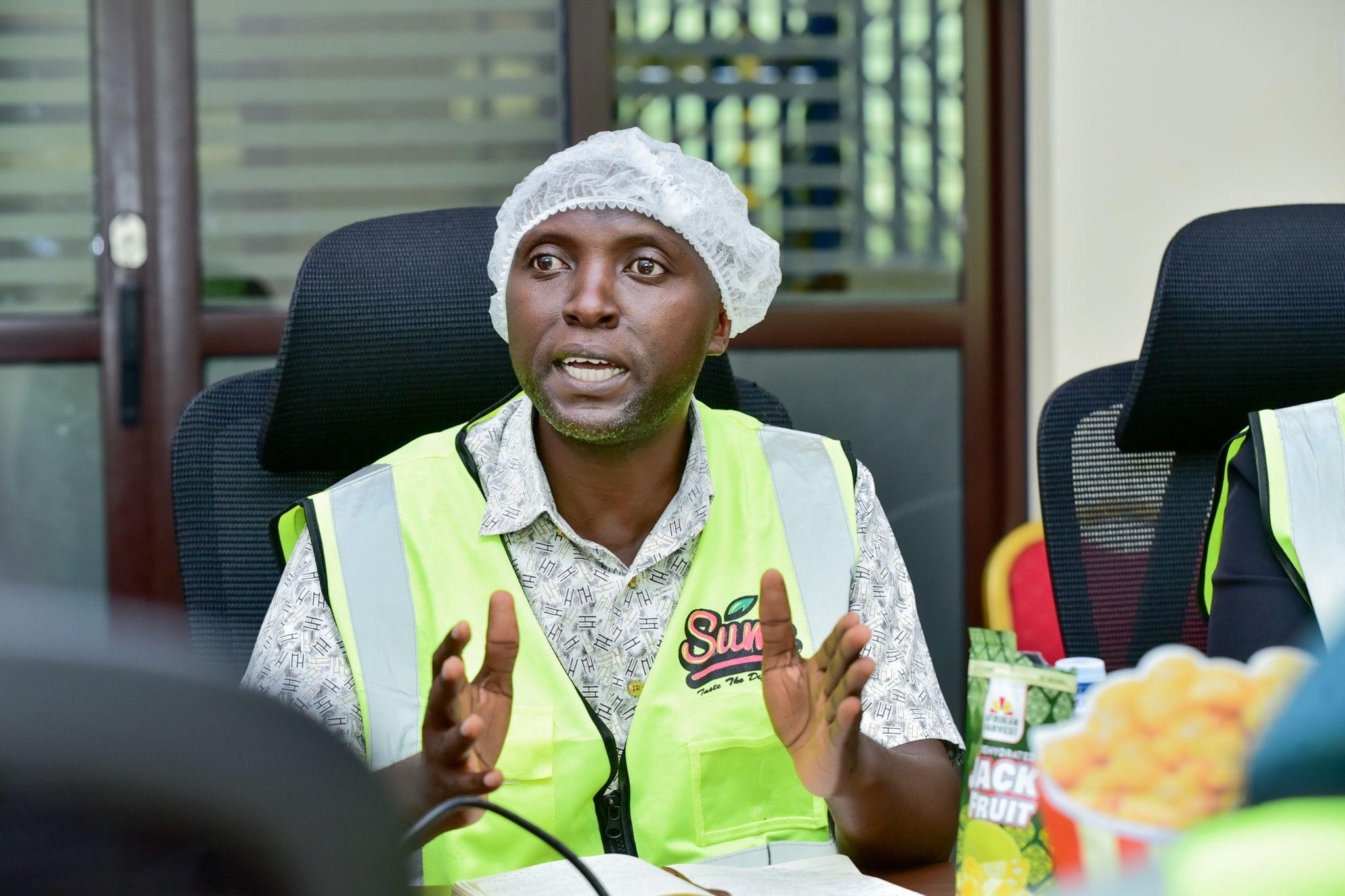
He further suggested specialised courses tailored to the factory’s needs and attachment of research students interested in manufacturing. Such collaboration would contribute to curriculum responsiveness and ensure that graduates are equipped with market-relevant competencies.
Strengthening University–Industry Linkages
The engagement reflects Makerere University’s continued commitment to strengthening partnerships that bridge knowledge generation and real-sector application.
Both institutions expressed a shared vision of building a structured, mutually beneficial collaboration that integrates research, innovation, skills development, and enterprise growth, positioning the University as a key knowledge partner in Uganda’s manufacturing transformation.
Discussions remain ongoing as both parties refine priority areas for formalisation.
Caroline Kainomugisha is the Communications Officer, Advancement Office.
General
Makerere University commemorates 13 transformative years of partnership with Mastercard Foundation
Published
2 days agoon
March 2, 2026
On Friday, 27th February 2026, Makerere University proudly celebrated 13 years of a significant partnership with the Mastercard Foundation, a prestigious independent organisation headquartered in Toronto, Canada. Since its inception in 2013 with the launch of the Scholars Program-currently headed by Prof. Justine Namaalwa, this collaboration has grown significantly, expanding to include two additional initiatives: The E-learning Initiative-headed by Prof. Paul Muyinda Birevu and the Africa Climate Collaborative-headed by Prof. Gorretie Nabanoga. This long-term partnership underscores the shared commitment to fostering education, innovation, and sustainability in Uganda and across Africa.
The colourful event coincided with the 76th Graduation Ceremony, during which Makerere University honoured Ms. Reeta Roy, the Founding President and CEO of the Mastercard Foundation, with an honorary Doctor of Laws.

In her commencement speech, Ms. Roy thanked Makerere University for considering a partnership with the Mastercard Foundation and for conferring upon her a prestigious honorary award.
“Mastercard Foundation is honoured to collaborate with this esteemed university, and I appreciate the recognition through this award. I am excited to be associated with Makerere University and look forward to actively embodying its values. Joining the broader community of alumni from this distinguished institution is a privilege, and I am eager to contribute to its legacy,” stated Ms. Roy.

During the reception in honour of Ms. Roy, the Chairperson of Makerere University Council, Dr. Lorna Magara, acknowledged the invaluable support from the Mastercard Foundation. She emphasised the profound impact of the Foundation’s various initiatives, particularly the scholarships for disadvantaged youth, which enable them to access higher education and opportunities that might have otherwise been beyond their reach.
“On behalf of the Makerere University Council and the broader University community, I extend our sincere gratitude to Mastercard Foundation for its commitment to collaborating with Makerere University in various endeavours, especially for providing scholarships to our underprivileged young people who would never have stepped inside a lecture room at the University.” Dr. Magara stated.

Dr. Magara, in a special way, thanked Ms. Roy for her transformative leadership and unwavering commitment to supporting young people in Africa, citing her efforts to ensure young people get their voices heard.
“As a university, our business is with young people. We are therefore committed to providing the environment and education that deliver meaningful pathways. We will provide an environment that ensures young people have a voice and agency to create meaningful change in society.” Dr. Magara pledged.

Dr. Magara further congratulated Ms. Roy on her honorary Doctor of Laws from Makerere University, noting that it is the university’s highest honour for individuals who have excelled in their careers.
“On behalf of the Makerere University community, I would like to extend my heartfelt congratulations on your honorary Doctor of Laws. This esteemed recognition represents the highest honour our institution can bestow on individuals who have demonstrated exceptional achievement and excellence across various facets of their career.” Dr. Magara remarked.
Prof. Justine Namaalwa, the Program Director of the Mastercard Foundation Scholars Program and the Coordinator for all Mastercard Foundation Initiatives at Makerere University, expressed her appreciation for the thirteen-year collaboration between Makerere University and the Mastercard Foundation. She highlighted that the partnership had yielded significant, impactful results.

“In 2013, Makerere University partnered with the Mastercard Foundation to educate the next generation of transformative African leaders who can positively impact their lives, their communities, and the economies of Africa. The partnership has had a significant impact. I thank the University Management and the Foundation team for this visionary collaboration,” remarked Prof. Namaalwa.
Prof. Namaalwa articulated that the partnership with the Mastercard Foundation is primarily focused on empowering young people as agents of change for transformational leadership in Africa. She presented compelling statistics demonstrating the positive impact of the scholars’ program, highlighting the success of individuals who have completed their education and their subsequent professional experiences after university graduation.

“This partnership focuses on young people, aiming to create positive change in their lives. To date, the Scholars Program has graduated 974 alumni, with 48% securing formal employment, 18% starting their own businesses, 8% participating in internships, and 5% pursuing further education. Overall, 72% of Scholar alumni are actively engaged in employment or entrepreneurship,” Prof. Namaalwa stated.
The colourful event showcased a dynamic array of activities that highlighted the entrepreneurial spirit of Scholars and alumni from the Mastercard Foundation at Makerere University. Attendees enjoyed a mini-exhibition featuring innovative products from these ventures.

A video documentary illustrated the positive impact of the three Mastercard Foundation initiatives. The event also featured inspiring poetry recitations by Scholars and a lively atmosphere of music and dance, creating an engaging and memorable experience for all participants.
The high-level event was attended by senior University officials, led by the Chairperson of Council, Dr. Lorna Magara; the Vice-Chancellor, Prof. Barnabas Nawangwe; the Vice-Chancellor, Academic Affairs, Prof. Sarah Ssali, Deputy, and the Ag. Deputy Vice-Chancellor, Finance and Administration Prof. Winston Tumps Ireeta. Mr Yusuf Kiranda, the University Secretary; and Prof. Buyinza Mukadasi, the Academic Registrar, Chancellor Emeritus-Prof. Ezra Suruma, former Chairperson of the Steering Committee of Mastercard Foundation Scholars Program-Prof. Umar Kakumba, and the Deputy Executive Secretary, RUFORUM, and former Program Coordinator of the Scholars Program at Makerere University-Dr. Florence Nakayiwa, among many other officials graced the function.

The event was also graced by a high-level delegation from the Mastercard Foundation, led by Ms. Reeta Roy, the Founding President of the Foundation, and included the Mastercard Foundation Teams from the Country offices in Kigali, Nairobi, and Kampala; the Program partners; the Mentors, Scholars and alumni; as well as the Program staff of the three Mastercard Foundation Initiatives at Makerere University.
At the end of the event, Makerere University honoured Ms. Reeta Roy with University memorabilia, including a pencil-drawn portrait, a pencil-drawn photo of the Ivory Tower, and other Ugandan crafts. Ms. Roy cut a graduation cake together with the 10 graduates of the 76th graduation ceremony from the Mastercard Foundation Scholars Program.
Bernard Buteera is the Principal Public Relations Officer for the Mastercard Foundation Scholars Program at Makerere University.

It is with great pleasure that I welcome you to this edition of Mak News Magazine, a publication that continues to chronicle Makerere University’s journey as a centre of academic excellence, innovation, and societal transformation.
The stories featured in this issue vividly demonstrate Makerere’s unwavering commitment to addressing national, regional, and global challenges through research, partnerships, and people-centred solutions. They reflect a university that is deeply engaged with society, one that applies knowledge not only to advance scholarship, but also to improve lives.
A recurring theme in this edition is innovation for resilience and inclusion. From the College of Agricultural and Environmental Sciences’ Healthy Soy Initiative combating child malnutrition amid climate change, to the cutting-edge work of CEDAT’s Team Green Minds integrating IoT into agriculture, Makerere continues to harness science and technology to respond to pressing development needs. Equally inspiring is the College of Natural Sciences’ success in securing international funding to scale up fish processing technologies, with a deliberate focus on empowering women and strengthening livelihoods.
This issue also highlights Makerere’s growing role in advancing health and wellbeing. The launch of the Early Intervention Psychiatry Services Clinic at Makerere University Hospital marks an important step in strengthening mental health services, while the Hospital’s transformation from a modest sickbay into a centre of excellence stands as a testament to decades of strategic investment, dedication, and service to the nation.
Our commitment to education access and global engagement is equally evident. Strategic partnerships, such as that between the College of Education and External Studies and the Uganda Vocational and Technical Assessment Board, are expanding pathways to quality education. The establishment of the first-ever United States Studies Centre in the Great Lakes Region positions Makerere as a hub for dialogue, research, and policy engagement on global affairs. We also celebrate our vibrant international community, with graduates drawn from 67 nationalities—affirming Makerere’s status as a truly global university.
This edition further showcases initiatives that ensure long-term institutional sustainability, including the launch of the CoCIS Endowment Fund, infrastructure developments such as the modern hostel at Buyana Farm, and transformative programmes supported by the Mastercard Foundation that continue to empower young people across the continent.
As you read through these pages, I invite you to reflect on the collective effort of our students, staff, alumni, partners, and supporters whose contributions make these achievements possible. Together, we continue to shape Makerere University as a place where knowledge serves humanity.
I wish you an engaging and inspiring read.
Prof. Barnabas Nawangwe
VICE CHANCELLOR
Trending
-

 Humanities & Social Sciences1 week ago
Humanities & Social Sciences1 week agoMeet Najjuka Whitney, The Girl Who Missed Law and Found Her Voice
-

 General1 week ago
General1 week ago76th Graduation Highlights
-

 Agriculture & Environment2 weeks ago
Agriculture & Environment2 weeks agoUganda Martyrs Namugongo Students Turn Organic Waste into Soap in an Innovative School Project on Sustainable Waste Management
-

 Health2 weeks ago
Health2 weeks agoMakerere University School of Public Health Graduates First Cohort of Cost-Effectiveness Analysis Short Course
-

 Agriculture & Environment1 week ago
Agriculture & Environment1 week agoCAES Presents Overall Best Performing Student in the Sciences & a Record 28 PhDs at the 76th Graduation Ceremony
